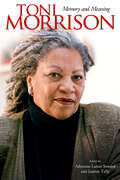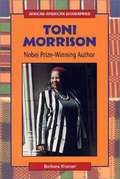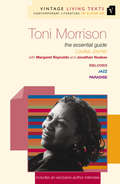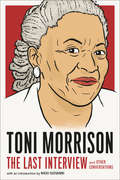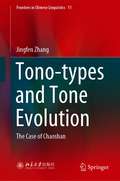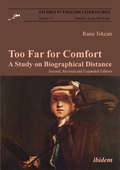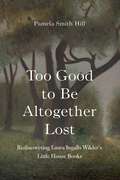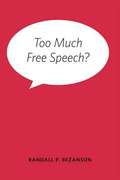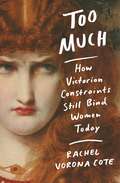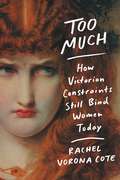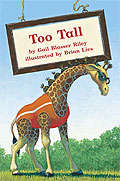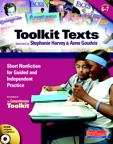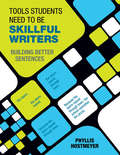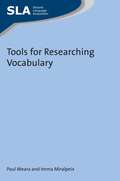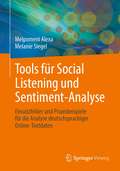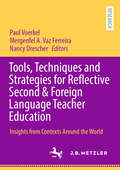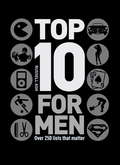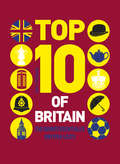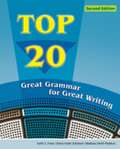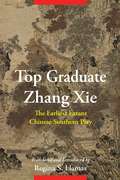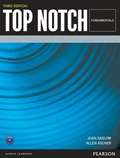- Table View
- List View
Toni Morrison: Memory and Meaning
by Adrienne Lanier Seward and Justine TallyToni Morrison: Memory and Meaning boasts essays by well-known international scholars focusing on the author’s literary production and including her very latest works—the theatrical production Desdemona and her tenth and latest novel, Home. These original contributions are among the first scholarly analyses of these latest additions to her oeuvre and make the volume a valuable addition to potential readers and teachers eager to understand the position of Desdemona and Home within the wider scope of Morrison’s career. Indeed, in Home, we find a reworking of many of the tropes and themes that run throughout Morrison’s fiction, prompting the editors to organize the essays as they relate to themes prevalent in Home.In many ways, Morrison has actually initiated paradigm shifts that permeate the essays. They consistently reflect, in approach and interpretation, the revolutionary change in the study of American literature represented by Morrison’s focus on the interior lives of enslaved Africans. This collection assumes black subjectivity, rather than argues for it, in order to reread and revise the horror of slavery and its consequences into our time. The analyses presented in this volume also attest to the broad range of interdisciplinary specializations and interests in novels that have now become classics in world literature. The essays are divided into five sections, each entitled with a direct quotation from Home, and framed by two poems: Rita Dove’s “The Buckeye” and Sonia Sanchez’s “Aaayeee Babo, Aaayeee Babo, Aaayeee Babo.”
Toni Morrison: Nobel Prize-winning Author
by Barbara KramerExamines the life and work of the successful novelist, who became the first African-American to win the Nobel Prize in Literature in 1993.
Toni Morrison: The Essential Guide (Vintage Living Texts #14)
by Louisa Joyner Margaret Reynolds Jonathan NoakesIn Vintage Living Texts, teachers and students will find the essential guide to the works of Toni Morrison. Vintage Living Texts is unique in that it offers an in-depth interview with Toni Morrison, relating specifically to the texts under discussion. This guide deals with Morrison's themes, genre and narrative technique, and a close reading of the texts will provide a rich source of ideas for intelligent and inventive ways of approaching the novels.Also included in this guide are detailed reading plans for the novels, questions for essays and discussion, contextual material, suggested texts for complementary and comparative reading, extracts from reviews, a biography, bibliography and a glossary of literary terms. Whether a teacher, student or general reader, Vintage Living Texts gives you the chance to explore new resources and enjoy new pleasures.
Toni Morrison: and Other Conversations (The Last Interview Series)
by Melville House&“Knowledge is what&’s important, you know? Not the erasure, but the confrontation of it.&” — TONI MORRISON In this wide-ranging collection of thought-provoking interviews — including her first and last — Toni Morrison (whom President Barrack Obama called a &“national treasure&”) details not only her writing life, but also her other careers as a teacher, and as a publisher, as well as the gripping story of her family. In fact, Morrison reveals here that her Nobel Prize-winning novels, such as Beloved and Song of Solomon, were born out of her family&’s stories — such as those of her great-grandmother, born a slave, or her father, escaping the lynch mobs of the South. With an introduction by her close friend, poet Nikki Giovani, Morrison hereby weaves yet another fascinating and inspiring narrative — that of herself.
Tono-types and Tone Evolution: The Case of Chaoshan (Frontiers in Chinese Linguistics #11)
by Jingfen ZhangThis book is a comprehensive study on the phonetic characteristics of citation tones in Chaoshan Chinese. It presents the tonal patterns of 65 localities in the Chaoshan area under the “multiple-register and four-level” tonal model. Three case studies are conducted to delve into the evolutionary paths of Chaoshan tones. This book not only provides a large-scale typological study on Chaoshan Chinese, but also offers a good example of how to figure out the evolutionary paths of tones from the perspective of variation. The natural alliance of phonetics, historical linguistics, sociolinguistics, and dialect geography is reinforced. It is also suggested in this book that the joint use of these four disciplines is very promising for the study of Chinese.
Too Close for Comfort (Comprehension Power Readers)
by Modern PressGood News, Bad News, Brotherly Love, Three Heads Are Better Than Two.
Too Far for Comfort: A Study on Biographical Distance (Studies in English Literatures #15)
by Rana TekcanThe dynamic between the biographer and the subject is one of the most fascinating aspects of biography as a genre. How does the biographer stage the illusion that is the narrative life, the illusion that the subject assumes a living form through words? In contrast to purely fictional forms, biography writing does not allow total freedom to the biographer in this creative act. Ideally, a biography's backbone is structured by accurate historical facts. But its spirit lies elsewhere. Rana Tekcan explores how some of the most accomplished biographers manage to recreate "life" across time and space. She looks at their illusionary art through the narrative strategies in Samuel Johnson's Life of Savage, James Boswell's Life of Johnson, Lytton Strachey's Eminent Victorians, Michael Holroyd's Lytton Strachey, Park Honan's Jane Austen, and Andrew Motion's Keats. She notes three types of distance in biographical narrative: First, where the biographer and the subject personally know one another; second, where the biographer is a near contemporary of the subject; and third, where biographer and subject are distinctly separated, in some cases, by hundreds of years.
Too Good To Be True: Life and Work of Leslie Fiedler
by Mark Royden WinchellBiography and analysis of Fiedler's writings.
Too Good to Be Altogether Lost: Rediscovering Laura Ingalls Wilder's Little House Books
by Pamela Smith HillLaura Ingalls Wilder, author of the well-known Little House series, wrote stories from her childhood because they were &“too good to be altogether lost.&” And those stories seemed far from being lost during the remainder of her lifetime and through most of the twentieth century. They were translated into dozens of languages; generations of children read them at school; and dedicated readers made pilgrimages to the settings of the Little House books. With the release of NBC&’s Little House on the Prairie series in 1974, Wilder was well on her way to becoming an international literary superstar. Simultaneously, however, the novels themselves began to slip from view, replaced by an onslaught of assumptions and questions about Wilder&’s values and politics and even about the books&’ authenticity. From the 1980s, a slow but steady critical crescendo began to erode Wilder&’s literary reputation. In Too Good to Be Altogether Lost, Wilder expert Pamela Smith Hill dives back into the Little House books, closely examining Wilder&’s text, her characters, and their stories. Hill reveals that these gritty, emotionally complex novels depict a realistic coming of age for a girl in the American West. This realism in Wilder&’s novels, once perceived as a fatal flaw, can lead to essential discussions not only about the past but about the present—and the underlying racism young people encounter when reading today. Hill&’s fresh approach to Wilder&’s books, including surprising revelations about Wilder&’s novel The First Four Years, shows how this author forever changed the literary landscape of children&’s and young adult literature in ways that remain vital and relevant today.
Too Many Rabbit Holes
by Marcie Aboff Jin ChiuThe fun and excitement of English and Language Arts learning continues in Grade 2 of Reading Street. This comprehensive and dynamic curriculum for homeschooling is geared toward young children who have some foundational English and Language Arts knowledge and are ready to strengthen their skills. Comprised of engaging activities, challenging content and weekly quizzes, Reading Street: Grade 2 is the next step in your child's path toward becoming a lifelong learner and reader. As with all Reading Street products, the Grade 2 system is formatted to help students meet certain age-appropriate goals. After completing this English and Language Arts homeschool program, your child should be able to: Read and comprehend two-syllable words. Identify common prefixes (such as pre-, un-, or re-) and suffixes (such as -able, -ad and -er). Correct mistakes made when reading out loud. Read books with two or more chapters. Understand the structure of stores (i. e. beginning, middle and end). Start selecting reading materials based on his/her own interests. Identify the "who," "what," "when," "where," "why" and "how" of the text. While the goals of second Grade English and Language Arts are numerous, Reading Street will help you craft engrossing lessons. Your child will garner important English and Language Arts skills while completing a workbook, reading stories and poems, and taking assessments. Planning these lessons will be easier than ever, as all Reading Street systems are broken down into weekly Big Ideas. All the work your child does on a given week is formulated around that single concept for an organized and challenging curriculum. With six easy-to-follow units, Reading Street: Grade 2 is the perfect tool for homeschooling parents. Your child will enjoy the reading selections and activities, and you'll love to see your student growing into a knowledgeable individual. We're confident that this product is the right one for you. For more information on the specific materials found in Grade 2 of Reading Street, check out the Features and Benefits page.
Too Much Free Speech?
by Randall P. BezansonIn Too Much Free Speech?, Randall P. Bezanson takes up an essential and timely inquiry into the Constitutional limits of the Supreme Court's power to create, interpret, and enforce one of the essential rights of American citizens. Analyzing contemporary Supreme Court decisions from the past fifteen years, Bezanson argues that judicial interpretations have fundamentally and drastically expanded the meaning and understanding of "speech." Bezanson focuses on judgments such as the much-discussed Citizens United case, which granted the full measure of constitutional protection to speech by corporations, and the Doe vs. Reed case in Washington state, which recognized the signing of petitions and voting in elections as acts of free speech. In each case study, he questions whether the meaning of speech has been expanded too far and critically assesses the Supreme Court's methodology in reaching and explaining its expansive conclusions. Bezanson's measured approach and deep insights reveal the complexities of speech in the realms of human behavior and constitutional law. His wide-ranging analysis of relevant Supreme Court cases arms readers with the facts and perspectives necessary to reach independent conclusions about whether the Court's conduct befitted the independent judicial branch and to understand the consequences of its decisions for a representative democracy.
Too Much: How Victorian Constraints Still Bind Women Today
by Rachel Vorona CoteLacing cultural criticism, Victorian literature, and storytelling together, Too Much explores how culture corsets women's bodies, souls, and sexualities - and how we might finally undo the strings.Written in the tradition of Shrill, Dead Girls, Sex Object and other frank books about the female gaze, Too Much encourages women to reconsider the beauty of their excesses - emotional, physical, and spiritual. Rachel Vorona Cote braids cultural criticism, theory, and storytelling together in her exploration of how culture grinds away our bodies, souls, and sexualities, forcing us into smaller lives than we desire. An erstwhile Victorian scholar, she sees many parallels between that era's fixation on women's 'hysterical' behavior and our modern policing of the same; in the space of her writing, you're as likely to encounter Jane Eyre and Lizzie Bennet as you are Britney Spears and Lana Del Rey. This book will tell the story of how women, from then and now, have learned to draw power from their reservoirs of feeling, all that makes us 'too much'.
Too Much: How Victorian Constraints Still Bind Women Today
by Rachel Vorona CoteLacing cultural criticism, Victorian literature, and storytelling together, "TOO MUCH spills over: with intellect, with sparkling prose, and with the brainy arguments of Vorona Cote, who posits that women are all, in some way or another, still susceptible to being called too much." (Esmé Weijun Wang)A weeping woman is a monster. So too is a fat woman, a horny woman, a woman shrieking with laughter. Women who are one or more of these things have heard, or perhaps simply intuited, that we are repugnantly excessive, that we have taken illicit liberties to feel or fuck or eat with abandon. After bellowing like a barn animal in orgasm, hoovering a plate of mashed potatoes, or spraying out spit in the heat of expostulation, we've flinched-ugh, that was so gross. I am so gross. On rare occasions, we might revel in our excess--belting out anthems with our friends over karaoke, perhaps--but in the company of less sympathetic souls, our uncertainty always returns. A woman who is Too Much is a woman who reacts to the world with ardent intensity is a woman familiar to lashes of shame and disapproval, from within as well as without. Written in the tradition of Shrill, Dead Girls, Sex Object and other frank books about the female gaze, TOO MUCH encourages women to reconsider the beauty of their excesses-emotional, physical, and spiritual. Rachel Vorona Cote braids cultural criticism, theory, and storytelling together in her exploration of how culture grinds away our bodies, souls, and sexualities, forcing us into smaller lives than we desire. An erstwhile Victorian scholar, she sees many parallels between that era's fixation on women's "hysterical" behavior and our modern policing of the same; in the space of her writing, you're as likely to encounter Jane Eyre and Lizzie Bennet as you are Britney Spears and Lana Del Rey. This book will tell the story of how women, from then and now, have learned to draw power from their reservoirs of feeling, all that makes us "Too Much."
Too Small (Primary Phonics #Set 5 Book 8)
by Barbara W. MakarA systematic, phonics-based early reading program that includes: the most practice for every skill, decodable readers for every skill, and reinforcement materials--help struggling students succeed in the regular classroom
Too Tall (Fountas & Pinnell LLI Green #Level J, Lesson 101)
by Gail RileyFountas and Pinnell Leveled Literacy Intervention Green System -- 1st Grade
Toolkit Texts: Short Nonfiction for Guided and Independent Practice Grades 6-7
by Stephanie Harvey; Anne GoudvisIn response to the overwhelming demand for more high-quality, age-appropriate nonfiction texts, Stephanie Harvey and Anne Goudvis have developed the four-volume series Toolkit Texts: Short Nonfiction for Guided and Independent Practice. Each volume provides a library of age-appropriate nonfiction articles in a reproducible format.
Tools Students Need to Be Skillful Writers: Building Better Sentences
by Phyllis HostmeyerBuild stronger writers one sentence at a time. Imagine a classroom full of enthusiastic student writers, capable of reviewing their own work with a critical eye, then crafting a polished, convincing piece. This is possible, if you take writing instruction down to its basic building block—a solid sentence—and advance from there. Phyllis Hostmeyer can show you how with Tools Students Need to Be Skillful Writers, your blueprint for effective writing instruction and unit development. Packed with lessons across grades 3-12, this indispensable handbook features: A variety of sentence patterns presented in a logical sequence An explanation of each pattern’s structure and conventions Reinforcement activities and sample sentences for each pattern Activities to develop the essential instructional vocabulary. Along the way, all students, including English language learners, will gain the fluency and automaticity they need as we equip them with the college and career-readiness skills so central to the Common Core.
Tools for Researching Vocabulary
by Paul Meara Imma MiralpeixThis book introduces an innovative collection of easy-to-use computer programs that have been developed to measure and model vocabulary knowledge. The book aims to help researchers discover new instruments for lexical analysis, and provides a theoretical framework in which studies with such tools could be conducted. Each of the programs comes with a short manual explaining how to use the program, an example of a published paper that uses the program and a set of questions that readers can develop into proper projects. The programs can be used in real research projects and have the potential to break new ground for research in L2 vocabulary acquisition. The book will be of great use to final year undergraduates and masters students in applied linguistics, second language acquisition, psycholinguistics and language testing and to PhD students doing research methods courses.
Tools für Social Listening und Sentiment-Analyse: Einsatzfelder und Praxisbeispiele für die Analyse deutschsprachiger Online-Textdaten
by Melanie Siegel Melpomeni AlexaMit diesem Buch lernen Sie, wie Sie Social Listening und Sentiment-Analyse professionell einsetzen können. Der Leser erhält Schritt-für-Schritt-Beschreibungen für verschiedene Einsatzszenarien, gekoppelt mit Übungsaufgaben und nützlichen Materialien, darunter ein Merkblatt für Kennzahlen, eine Checkliste für die Toolauswahl und ein Glossar für Fachbegriffe. Dieses Lehr- und Praxisbuch verdeutlicht anhand von Anwendungsszenarien und Praxisbeispielen, wie Tools und Technologien für Social Listening und Sentiment-Analyse für die Analyse deutschsprachiger Online-Textdaten angewandt werden können und welche Vorteile diese bringen. Der Leser erhält einen Überblick über wichtige Funktionalitäten aktuell verfügbarer Social-Listening-Tools und deren Einsatzmöglichkeiten.
Tools, Techniques and Strategies for Reflective Second & Foreign Language Teacher Education: Insights from Contexts Around the World
by Paul Voerkel Mergenfel A. Vaz Ferreira Nancy DrescherEssential questions about the skills teachers need for effective classroom practice have raised by researchers such as Shulman, Schön, Altrichter & Posch and Hattie, and discussions still continue. In this context, the anthology combines theoretical studies and practical insights about Reflection from foreign and second language teacher education and professional development. It includes examples of reflective tools, techniques and strategies that can help teachers to (re)think their practices and ensure the quality of their everyday work.
Top 10 for Men: Over 250 lists that matter (Top 10)
by Russell Ash Brendan Mcginley Brian CullenIt's a fact that men love lists: with lists, men can find the most interesting information with the least amount of effort. This book contains over 250 lists covering the most important subjects in life - cars, sports, barbecues, gadgets - and answers the most vital questions: Are Ferraris faster than Lamborghinis? What's the most common murder weapon? Who was the fattest Prime Minister? Which city has the highest proportion of women to men? What's the most alcholic beer in the world?No matter what your chosen subject may be, Top 10 for Men is a must for every pub-trivia king.
Top 10 of Britain: 250 quintessentially British lists (Top 10)
by Russell AshFrom the bestselling author of "Hamlyn's Top 10 of Everything" series comes a special collection of 250 unique lists that observe of the idiosyncrasies of our Isles and encompass everything British. Discover hundreds of essential, intriguing and bizarre facts about your country's most iconic subjects, including: the 10 most produced plays by Shakespeare; 10 defunct British national holidays; the 10 longest seaside piers; the 10 lowest-scoring UK Eurovision entries; the 10 latest winners of the World Conker Championships; the 10 first performed Gilbert & Sullivan operas; the Top 10 singles of all time banned by the BBC; 10 unusual British laws; the Top 10 Tesco's lines; the 10 latest winners of the Pub of the Year award ...plus 240 other fascinating lists in this at-a-glance guide to what makes Britain great.
Top 20 Great Grammar For Great Writing
by Barbara Smith-Palinkas Keith Folse Elena SolomonBy providing instruction and practice of the 20 most troublesome grammar points, Top 20 helps students master the essential grammar they need to produce great writing at the intermediate to advanced levels.
Top Graduate Zhang Xie: The Earliest Extant Chinese Southern Play (Translations from the Asian Classics)
by Regina S. LlamasTop Graduate Zhang Xie is the first extant play in the Chinese southern dramatic tradition and a milestone in the history of Chinese literature. Dating from the early fifteenth century, but possibly composed earlier, it is the work of a writing club called the Nine Mountain Society.The play relates the story of a talented scholar who sets off for the capital to take the imperial exams. On the road, he is robbed and beaten by a bandit. In a nearby village temple he meets an orphaned girl who nurses him back to health and whom he marries. Once he takes first place in the exams, however, he comes to regret the marriage, setting in motion a series of decisions with dire consequences. Underlying the drama are preposterous farce, a penchant for puns, and ingenious play on the conventions of theater.This story of love, ambition, and betrayal speaks to the tensions created by the expectations that family, society, and state placed on the scholar. The examination system offered families the promise of social and economic advancement through an official position. The state relied on these men for the administration of the empire, and society expected that education in the classics would produce moral men. The play offers a critique of the scholar’s ideal, the education system, and the ethical values this process was intended to instill.This first full English-language translation of Top Graduate Zhang Xie features a detailed introduction that discusses the foundations of Chinese drama and the play’s composition and performance.
Top Notch Fundamentals
by Joan Saslow Allen AscherTop Notch program makes English unforgettable through multiple exposures to language, numerous opportunities to practice it, and systematic and intensive recycling. Goals- and achievement-based lessons with can-do statements enable students to confirm their progress. Top Notch prepares students to communicate in English with a diverse array of speakers around the world who have a wide range of native and non-native accents. An emphasis on cultural fluency enables students to navigate the social, travel, and business situations that they will encounter in their lives.
